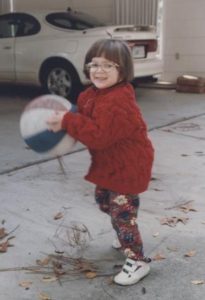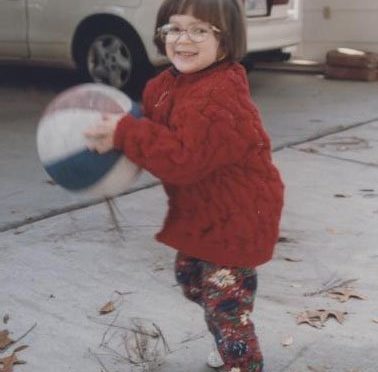 Four years ago, I was volunteering at the hydrocephalus center for a fairly famous hospital. I had been invited to sit in on an important meeting or procedure – I don’t actually remember which at this point. What I do remember is that I was going to be late. I remember the consuming sense of dread, rage and confusion increased with every passing minute I sat in my car. I couldn’t be late. I didn’t know how to be late. So I did the only thing that seemed sensible to me at the time: I turned the car around and went home. Then I didn’t speak to the doctor who had been kind enough to let me volunteer with him for a few months. I wasn’t trying to be rude. I just didn’t know what to say.
Four years ago, I was volunteering at the hydrocephalus center for a fairly famous hospital. I had been invited to sit in on an important meeting or procedure – I don’t actually remember which at this point. What I do remember is that I was going to be late. I remember the consuming sense of dread, rage and confusion increased with every passing minute I sat in my car. I couldn’t be late. I didn’t know how to be late. So I did the only thing that seemed sensible to me at the time: I turned the car around and went home. Then I didn’t speak to the doctor who had been kind enough to let me volunteer with him for a few months. I wasn’t trying to be rude. I just didn’t know what to say.
I have a better understanding of what happened now. Words like “meltdown,” “rigidity,” and “routine,” have entered my vocabulary. In most ways, an autism diagnosis has improved my life. I have a better understanding of why I feel, think and do certain things. As a result, I am better equipped to address life’s problems. If I feel ‘bad,’ I know what to do about it, or at least have some sensible guidelines. A friend is angry at me because I unintentionally said something offensive? I recognize where I have a limitation, which makes it a lot easier to talk the problem out. Difficulty falling asleep? A weighted blanket has me sleeping better than sleeping pills ever did. Do I feel anxious or distant? It might be a good time to pop in some earplugs and turn down the volume. Do I feel like the edges of the world are wobbling because of something that should be totally insignificant? Now I know why.
A friend who knew me before I was diagnosed once suggested that space aliens must have abducted me and replaced me with a better version of me in the year or so since then. I’m not offended; He’s right. I’m happier than I ever thought was possible because I have learned how to make myself happy. Even better, if I don’t know, I have a community of peers I can ask for advice. I had always assumed that my quirks and difficulties were some sort of singular, perverse strangeness that I hatched alone in the dark. It’s hard to express the amount of relief I feel knowing that when I have a problem, there is a community of people who will say, “yes, me too.”
The downside to all of this is that my childhood is now viewed almost exclusively through the lens of tragedy. I don’t get to have stories anymore. It all has to get wedged into a pathology framework. My tendency to wander away from softball games to find bits of grass that I found particularly interesting? That’s now, “absence of interest in peers.” That time in 7th grade when a boy asked me to the school dance and I didn’t understand that’s what he was doing until years later? That’s no longer the awkwardness of adolescence. It’s, “atypical or unsuccessful response to social overtures of others” and “deficits in understanding.” Stories my parents told at parties for years are now unbearably awkward. I don’t pick up on a lot of non-verbal cues, but it’s hard to miss the shame and guilt that creeps in halfway through what was once a humorous anecdote upon the realization that whatever happened was yet another unnoticed sign of my autism.
I don’t think my parents should feel guilty. I’m happy. I have a job I enjoy. I have a partner that I love very much and who loves me. I do want my stories back, though. Neurodiversity isn’t just about accepting that people have different kinds of brains. Neurodiversity is about embracing that people have different kinds of brains. Stories about my childhood are still stories about my childhood. My autism does not negate the validity or meaning of my experiences. It doesn’t matter if my childhood meets certain diagnostic criteria. It’s still a childhood like anyone else’s childhood. I want to have stories again, like anyone else.


What is patently obvious is that you have remarkable insight and gifted writing skills. The combination should allow you to help so many people both by their better understanding themselves if they have the same problems and even more significantly if you reach the audience of people who have contact with others who have this problem. In summary you can be a remarkable resource. Keep up the writing and hopefully more and more people after reading your writings will broaden their horizons….
What a beautifully written account of your feelings and insight. I’m so happy to hear that you are happy, with your job and your relationship. You are going to help a lot of people who will look to you for guidance. You should be very proud.
Its hard to be utterly unpretentious while being so insightful. The honesty and descriptive power of your writing is a real gift. Many will undoubtedly benefit from this article and all the writing you are to contribute.. As your cousin, I’m just kvelling ;), happy to be among the proud witnesses of your awesome journey. Love you so much.
Thank you for sharing your story and reminding all of us that while the clinical is useful in diagnosing a problem, the clinical descriptions are not useful in everyday life. Reclaim your stories; they are yours to have and to hold.
Your date must already like you to be wilnilg to go out in the first place, so try to relax. I probably wouldn’t talk about Autism right away, not by name. I think you should explain your behavior if there are noticeable differences. If you don’t make much eye contact it might help your date to know that doesn’t mean you aren’t listening, things like that. If they bring it up or seem to be interested in ASD’s then it’d be OK, but in general it can be best to let them get to know you before you use a label they may have lots of mistaken beliefs about. If they know you first, then find out they’ll realize their beliefs were wrong,If your date is neurotypicalish, try to make accommodations. Remember that neurotypicals can’t process large groups of factual information about one topic all at once. It’s a bit of a disability, and your compassion would be appreciated. Try not to stay on one topic too long, unless your date is really into it too. It’s OK to ask if they want to change the subject from time to time.If you have difficulty reading social situations ASK questions. Neurotypicals forget that not everybody picks up on social clues or knows the rules. If you aren’t sure if your date is happy/sad it’s OK to ask, but don’t be too intense about it, that can be awkward.If you don’t have anything nice to say, don’t say anything. Neurotypicals have a sort of unspoken agreement not to say unkind things, even if they are true. They are usually aware of the unkind things and know the other is, but it’s disrespectful to say it outloud. Not all people have the social skills to do this. Mostly just be yourself, but be considerate of your date. Try to figure out how they feel and what they think, using words as needed. Talk about lots of things that interest you, and if your date brings up something they like but you don’t try to talk about it a little, or at least listen.My apologies if you know all or some of this already. I realize that PDD-NOS doesn’t mean you have no social skills, or that you have any particular symptom.
Wow, this hit me right in the chest. I am so glad when I was diagnosed as autistic because it gave me a way to understand all the things I thought were “wrong” with me, an idea about how to work with them, and the ability to forgive myself for what I can’t change. But I don’t tell anybody about it unless I’m very comfortable with them or I have no choice, because suddenly everything is viewed through that pathological lens. Other autistic people do it too. I think I know where they’re coming from – they’ve spent their whole lives being blamed and punished for what they did so it’s important for them to affirm that it wasn’t their fault. Or maybe it was painful for them at the time, and they want to bond over that. But I still want to be able to stories and have them be cute or funny or even neutral on my own/their own terms.
Hi Sara, thank-you for this, and “yes, me too”.
It’s 4yrs since my Dx. (Hf Asd/Aspie) which leaves 50+yrs of life experiences to re-frame.
Turning ‘Oh oh’s into ‘ah hah’s can be hard confronting work but we wouldn’t have it any other way, would we.
Earnest contributions like yours can work wonders and I look forward to reading more.
As the sweet potato said when the light came on ” I yam what I yam”
This is SO familiar… I don’t know whether to be happy or sad about that.
I’d trade these “lens of tragedy” for my family’s understanding in a heartbeat. Contrary to yours, mine thinks that, now that I know what problem I have, I’ll be cured if I try hard enough. Since I am obviously not cured at all, they always ask me to try harder. This gives me a sense of misunderstanding that sometimes is too hard to bear.
The denial system is also cruel; to some of them, I do not have anything and the doctors and psychologists are just making stuff up to rip me; since I am too naive to realise this, I keep dishing money into unnecessary treatments.
For the rest, I feel exactly the same you do; my few friends also told me how much I changed, for the best, after treatment.
Finally, thank you for the blanket tip; falling asleep is a nightmare for me and often I resort to sleeping pills. I’ll try to fix this with the blanket.
Sara, what a powerful, courageous article. Thanks so much for sharing it.
You’re very articulate here. Yes with mental illness too diagnosis is a double edged sword. It’s a relief to have a name for what’s going on, and ideas on how to help make things easier. Therapists who could help with certain things and especially peers. But we and others have to be careful not to see ourselves or others as just a diagnosis. Keep writing.